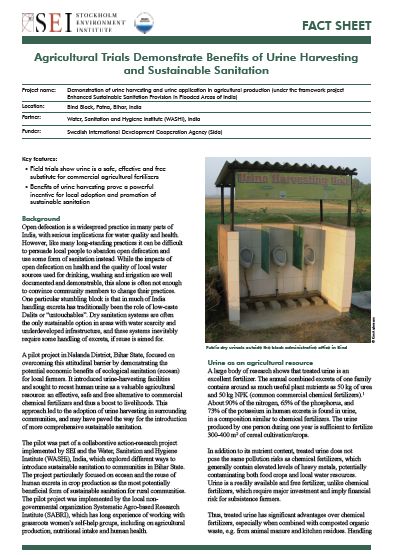Agricultural trials demonstrate benefits of urine harvesting and sustainable sanitation - Fact Sheet
Andersson, K. (2014)

Published in: 2014
Publisher:
Stockholm Environment Institute (SEI), Stockholm, Sweden
Author:
Andersson, K.
Uploaded by:
SuSanA secretariat
Partner profile:
common upload
4752 Views
64 Downloads
Content - Summary
This fact sheet describes a pilot project in Bind Block, Bihar State, India that set up urine-harvesting facilities and agricultural trials to demonstrate to local farmers and policy-makers the value of treated urine as a fertilizer.
The aim of the trials was to help change negative attitudes towards handling urine (and human excreta in general), which can be a major obstacle to the adoption of ecological sanitation (ecosan). Ecosan was deemed the most appropriate form of sustainable sanitation to introduce in Bihar, since it can not only help to reduce the health and environmental impacts of open defecation but can also improve rural livelihoods and nutrition for small-scale farmers through the productive reuse of treated excreta in agriculture.
The pilot project activities attracted a lot of interest among local farmers, leaders and agricultural experts, inspiring the wider adoption of both urine harvesting and other forms of ecosan in surrounding communities.
Bibliographic information
Andersson, K. (2014). Agricultural trials demonstrate benefits of urine harvesting and sustainable sanitation - Fact Sheet. Stockholm Environment Institute (SEI), Stockholm, Sweden
Filter tags
English Sub-Saharan Africa















